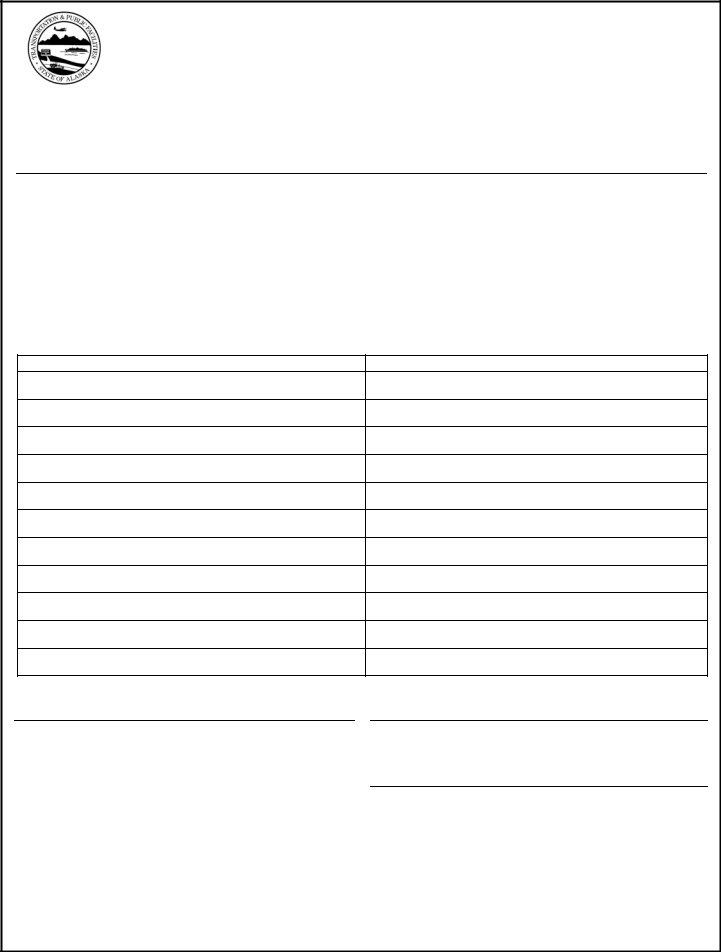In a world where supporting domestic industries has become increasingly important, the Form 25D-61 emerges as a pivotal document for contractors engaging with Federal-Aid Airport Contracts. This certificate, mandated by the State of Alaska Department of Transportation and Public Facilities, serves to uphold the "Buy American" ethos. It ensures that, unless specifically listed otherwise, all steel and manufactured products used in the project are produced within the United States. The form delineates a clear process: contractors must list any exceptions directly on the form or attach a detailed list, accompanied by manufacturer's mill test reports to substantiate the Buy American Certification. Alongside its primary function, Form 25D-61 also provides a comprehensive list of materials and supplies that the U.S. Government acknowledges as not being produced domestically in sufficient quality or quantity. This list not only spans a gamut of items—from common raw materials like acetylene and cocoa beans to more specialized goods like microprocessor chips but also details specific petroleum products' definitions, shedding light on what constitutes crude oil, finished products, and more. Such thoroughness ensures transparency and compliance, guiding contractors through the intricate requirements of sourcing materials for their projects.
| Question | Answer |
|---|---|
| Form Name | Form 25D 61 |
| Form Length | 3 pages |
| Fillable? | No |
| Fillable fields | 0 |
| Avg. time to fill out | 45 sec |
| Other names | 25D-61, ALASKA, MILSPEC, unroasted |

STATE OF ALASKA
DEPARTMENT OF TRANSPORTATION AND PUBLIC FACILITIES
BUY AMERICAN CERTIFICATE
Project Name and Number
By submitting a bid under this solicitation, except for those items listed by the offeror below or on a separate and clearly identified attachment, the offeror certifies that steel and each manufactured product is produced in the United States (as defined in Subsection
Attach manufacturer's mill test reports with the Buy American Certification signed by the manufacturer.
Articles, materials, and supplies excepted from this provision are listed on the reverse of this form.
PRODUCT1
COUNTRY OF ORIGIN
Contractor |
Signature of Contractor’s Representative |
Date
1.Enter “NONE” on the first line if there are no exceptions.
Form |
Page 1 of 3 |

List of supplies and materials that the U.S. Government has determined are not produced in the United States in sufficient and reasonably available quantities and of sufficient quality. (Jan 1991)
Acetylene, black Agar, bulk Anise
Antimony, as metal or oxide
Asbestos, amosite, chrysolite, and Crocidolite Bananas
Bauxite
Beef, corned, canned Beef extract
Bephenium Hydroxynapthoate Bismuth
Books, trade, text, technical, or scientific; newspapers; pamphlets; magazines; periodicals; printed briefs and films; not printed in the United States and for which domestic editions are not available.
Brazil nuts, unroasted Cadmium, ores and flue dust Calcium cyanamide Capers
Cashew nuts
Castor beans and castor oil Chalk, English Chestnuts
Chicle
Chrome ore or chromite Cinchona bark
Cobalt, in cathodes, rondelles, or other primary ore and metal forms. Cocoa beans
Coconut and coconut meat, unsweetened, in shredded, desiccated or similarly prepared form.
Coffee, raw or green bean Colchicine alkaloid, raw Copra
Cork, wood or bark and waste Cover glass, microscope slide Cryolite, natural
Dammar gum
Diamonds, industrial, stones and abrasives Emetine, bulk
Ergot, crude Erthrityl tetranitrate Fair linen, altar
Fibers of the following types: abaca, abace, agave, coir, flax, jute, jute burlaps, palmyra and sisal.
Goat and kidskins
Graphite, natural, crystalline, crucible grade Handsewing needles
Hemp yarn Hogbristles for brushes Hyoscine, bulk Ipecac, root
Iodine, crude Kaurigum Lac
Leather, sheepskin, hair type Lavender oil
Manganese Menthol, natural bulk Mica
Microprocessor chips (brought onto a construction site as separate units for incorporation into building systems during construction or repair and alteration of real property.)
Nickel, primary, in ingots, pigs, shots, cathodes, or similar forms; nickel oxide and nickel salts.
Nitroguanidine (also known as picrite) Nux vomica, crude
Oiticica oil
Olive oil Olives (green), pitted or unpitted, or stuffed, in bulk. Opium, crude
Oranges, mandarin, canned
Petroleum, crude oil, unfinished oils, and finished products (see definitions at the end)
Pine needle oil
Platinum and related group metals, refined as sponge, powder, ingots, or cast bars.
Pyrethrum flowers Quartz crystals Quebrancho Quinidine Quinine
Rabbit fur felt
Radium salts, source and special nuclear materials Rosettes
Rubber, crude and latex Rutile
Santonin, crude Secretin Shellac
Silk, raw and unmanufactured
Spare and replacement parts for equipment of foreign manufacture, and for which domestic parts are not available.
Spices and herbs, in bulk Sugars, raw
Swords and scabbards Talc, block, steatite Tantalum
Tapioca flour and cassava
Tartar, crude; tartaric acid and cream of tartar in bulk. Tea in bulk
Thread, metallic (gold) Thyme oil
Tin in bars, blocks, and pigs Triprolidine hydrochloride Tungsten
Vanilla beans Venom, cobra Wax, canauba
Woods; logs, veneer, and lumber of the following species: Alaskan yellow cedar, angelique, balsa, ekki greenhart, lignum vitae, mahogany, and teak.
Yarn, 50 Denier rayon
Form |
Page 2 of 3 |

List of Supplies/Materials that the U.S. Government Has Determined Are Not Produced In the United States In Sufficient and Reasonably Available Quantities And of Sufficient Quality (Jan 1991) (CONTINUED)
Petroleum terms are used as follows:
“Crude oil” means crude petroleum, as it is produced at the wellhead, and liquids (under atmospheric conditions) that have been recovered from mixtures of hydrocarbons that existed in a vaporous phase in a reservoir and that are not natural gas products.
“Finished products” means any one or more of the following petroleum oils, or a mixture or combination of these oils, to be used without further processing except blending by mechanical means:
(A)“Asphalt” - a solid or
(B)“Fuel oil” - a liquid or liquefiable petroleum product burned for lighting or for the generation of heat or power and derived directly or indirectly from crude oil, such as kerosene, range oil, distillate fuel oils, gas oil, diesel fuel, topped crude oil, or residues.
(C)“Gasoline” - a refined petroleum distillate that, by its consumption, is suitable for use as a carburant in internal combustion engines.
(D)“Jet fuel” - a refined petroleum distillate used to fuel jet propulsion engines.
(E)“Liquefied gases” - hydrocarbon gases recovered from natural gas or produced from petroleum refining and kept under pressure to maintain a liquid state at ambient temperatures.
(F)“Lubricating oil” - a refined petroleum distillate or specially treated petroleum residue used to lessen friction between surfaces.
(G)“Naphtha” - a refined petroleum distillate falling within a distillation range overlapping the higher gasoline and the lower kerosenes.
(H)“Natural gas products” - liquids (under atmospheric conditions) including natural gasoline, that -
(1)are recovered by a process of absorption, adsorption, compression, refrigeration, cycling, or a combination of these processes, from mixtures of hydrocarbons that existed in a vaporous phase in a reservoir, and
(2)when recovered and without processing in a refinery, definitions of products contained in subdivision (B), (C), and (G) above.
(I)“Residual fuel oil” - a topped crude oil or viscous residuum that, as obtained in refining or after blending with other fuel oil, meets or is the equivalent of MILSPEC
“Unfinished oils” means one or more of the petroleum oils listed under “Finished products” above, or a mixture or combination of these oils, that are to be further processed other than by blending by mechanical means.
Form |
Page 3 of 3 |